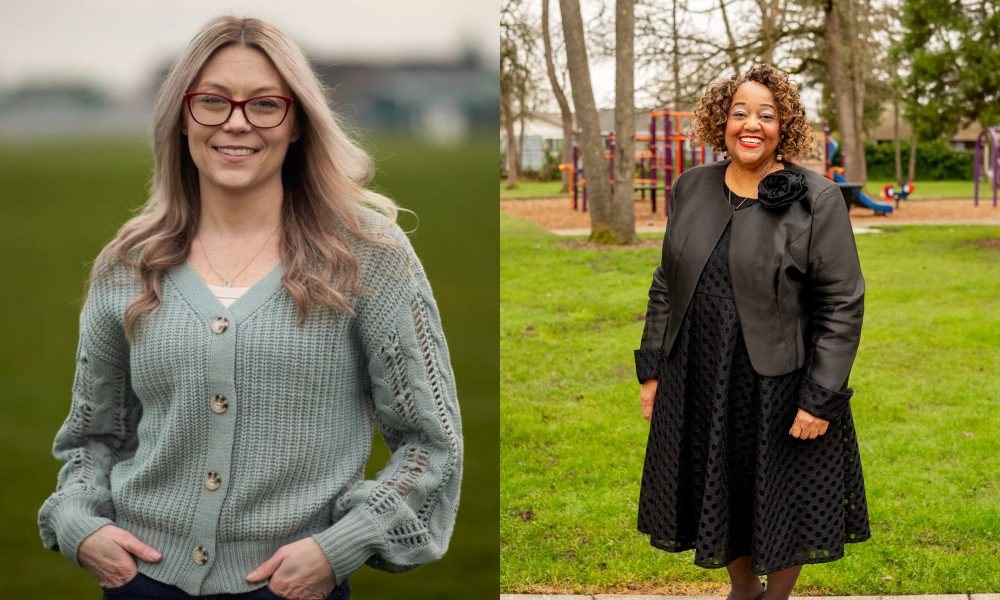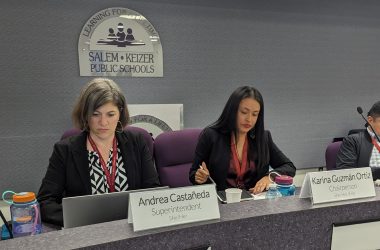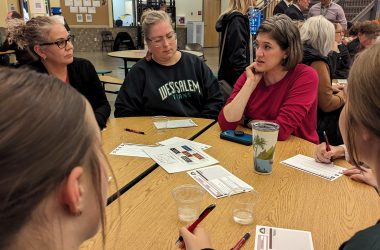Local voters get a chance to elect three school board directors on May 16, who will guide the Salem-Keizer School District as a new superintendent takes office.
Board directors oversee an annual budget of $1.3 billion and set broad priorities for the education of 40,000 local students.
This year, seats representing zone 2 in northeast Salem, zone 4 in southwest Salem and zone 6 in Keizer are up for election. All voters in the district can vote for all positions.
School board directors are unpaid volunteers. While officially nonpartisan, as in past elections, supporters and donors of the six declared candidates have lined up along largely partisan lines.
Salem Reporter sent candidates a questionnaire to get a sense of their positions on major issues facing the district. Along with their responses is information about candidates’ major donors and supporters.
In the northeast Salem zone, a longtime school district principal and administrator who recently retired is running against a parent who previously tried to recall three school board directors.
Cynthia Richardson, 66, is retiring as the Salem-Keizer School District’s director of equity, access and advancement at the end of June.
She was previously principal of North Salem and McKay High Schools. In her district role, Richardson advocated for more training on implicit bias and students’ cultural backgrounds to address higher rates of discipline and lower graduation rates for many students of color.
She’s supported by Community for Salem-Keizer Schools, a coalition of liberal groups, including the political action committees for the Salem-Keizer Education Association, the local teachers union, and farmworker union PCUN. She’s also endorsed by Progressive Salem.
The same group backed a successful slate of liberal candidates in the 2021 school board election, with voters electing Osvaldo Avila, Ashley Carson Cottingham, Karina Guzmán Ortiz and Maria Hinojos Pressey.
State law bars current school district employees from serving as school board directors. If elected, Richardson would take office July 1, one day after her planned retirement date.
Casity Troutt, 35, is a parent and owner of Sherwood-based Elite Fleet Services Inc. who’s been active in recent years protesting district policies which allow transgender students to change their name and pronouns in school directories without informing their parents, and advocating for returning police officers to local schools.
Troutt last August filed a recall petition against school board Chair Carson Cottingham, as well as Avila and Guzmán Ortiz. Her petitions referenced their votes to ban people with concealed carry permits from carrying firearms on school grounds, board members’ support for retaining challenged books about gender and sexuality in school libraries, and their handling of public comment during school board meetings. She also unsuccessfully petitioned to remove the book “Stamped (For Kids): Racism, Antiracism and You” from district elementary school libraries in 2022.
She’s supported by Marion + Polk First, a conservative group that also backed a slate of candidates in 2021, Oregon Right to Life and school board director Marty Heyen, who currently holds the zone 2 seat.
Cynthia Richardson
How long have you lived in the Salem-Keizer School District?
25 years, since 1997
Do you have any children currently in the district, or children who have graduated from the district? If so, please list their current grade(s) or graduation year(s).
Both of my kids graduated from Salem-Keizer schools. They were in the 4th and 6th grades, respectively, when we moved to Salem, and both graduated from McKay High School.
Please describe your previous experience with K-12 education or issues. This could include paid or volunteer work in schools or with youth, work in a related organization, or service on committees, boards, task forces, booster clubs, etc. Please include the year(s) for the work or service.
I have been an educator for over 40 years. I have been a teacher, Assistant Principal, and Principal, including of three schools here in Salem-Keizer. I was a teacher in Texas for 11 years from 1979 to 1990, then an Assistant Principal of four different schools from 1993 to 2000 (including Salem-Keizer schools McKay High School from 1997 to 1999, and Adam Stephens Middle School from 1999-2000). I was then the Principal of Adam Stephens from 2000 to 2003, McKay from 2003-2010, and North Salem High School from 2010 to 2017. I have worked at the Salem-Keizer school district since 2017 until my retirement this year.
Describe one volunteer circumstance where you held a leadership position and used that position to accomplish a specific goal. This is intended to share with readers a concrete example.
I am on the board of Marion Polk Food Share, and I am very proud of the work we do supporting families struggling to make ends meet. I also volunteer monthly at a local food share.
What one issue motivated you to run and how would you address that as a board member?
I am running because I have seen firsthand, as a Principal and educator, that we have too many students falling behind. Some kids are coming to school hungry or in crisis. Others are struggling in class and don’t know how to ask for help. As a Principal, I led North Salem High School to increasing reading scores and performance for all students. I want to bring that experience to advising the district on how to improve educational outcomes for all students.
What duties do you see rest solely with the school board separate from the Superintendent and executive district leadership?
I believe the school board’s role is to set high standards for student performance and to insist on accountability from the Superintendent and leadership team. As a school board member, I would take my experience as a Principal working with educators, staff, parents, and students to learn how our schools are performing for each child and push the district to resolve problems before they impact students’ education.
What skill would you bring to help board members resolve policy differences that divide the board or do you think instead such significant differences can’t be resolved?
As an educator and a Principal, I helped resolve conflicts between teachers, parents, students, and our community every day. I believe leadership is best accomplished by listening, and I would put in the hours to understand my fellow board member’s perspectives, along with parents, students, and others in the community. If we understand each other, I don’t think there are many policy differences that can’t be resolved.
The board has a specific policy to consider underserved, diverse, and marginalized individuals and groups when deciding school policies (often called the “equity lens”). How do you see that policy fitting into decisions you would make as a board member?
I have devoted my career to serving all students, especially those that face barriers. We cannot allow students that are struggling or face barriers to success in school to be left behind. As a Principal, I was proud to lead a team at McKay and North Salem High Schools that made great strides in closing the achievement gap for under-represented students, and I would bring that experience to the school board.
What is your understanding of student district reading scores compared to state and national figures, and what issue does that create for the board?
We need to have an intense focus on reading outcomes in our district. As a Principal, I led schools that had the second-largest increase in reading scores among similar schools. We need to bring additional resources and accountability to ensuring all our schools see continued increases in reading scores for all students. This includes more resources for english language learners.
What issue of school safety would you urge the board to address if you were elected?
Our district needs to focus on preparation and communication. I have led schools during fires, floods, lockdowns, and active shooter situations. I know what it means to take responsibility for the safety of students. We must work with first responders to stress-test plans in place for all possible emergencies and communicate with parents and students about safety plans before anything happens and about any incidents that occur.
What role do you see for the school board in vetting and approving book selections both for school libraries and classrooms?
The school board has a responsibility to ensure that all schools follow all relevant state and federal laws, along with existing district policies. They should ensure that any district staff making these selections are in full compliance with all rules, laws, and regulations and that their decisions are transparent and easy to understand for students, parents, and the public.
A new superintendent will start the same day the new board takes office. What should that Superintendent’s top priority be and why?
The top priority of our Superintendent should be examining our budget from the top down to determine if we are investing in the schools and students with the highest level of need. They also need to see how our students are performing and how they can improve, with the budget aligned with those improvement strategies.
Casity Troutt
How long have you lived in the Salem-Keizer School District?
Over 6 years. My husband and I moved to Salem in 2017 when he finished his career with the Navy. He was raised in Salem. We bought a house a couple of blocks from his childhood home, where his parents still live.
Do you have any children currently in the district, or children who have graduated from the district? If so, please list their current grade(s) or graduation year(s).
Yes, I currently have two children in the Salem-Keizer School District—a 10th grader at McKay and an 8th grader at Jane Goodall Environmental Middle School (JGEMS).
Please describe your previous experience with K-12 education or issues. This could include paid or volunteer work in schools or with youth, work in a related organization, or service on committees, boards, task forces, booster clubs, etc. Please include the year(s) for the work or service.
Currently I serve on the McKay Booster Club Board and have since 2021, I am currently 4-H leader, participate in the JGEMS parent club which was just recently reestablished after Covid, and I have volunteered as a judge for multiple FFA competitions including public speaking and manuscripts. I have also recently joined the board for Oregon Trenches University, a football program aimed at providing opportunities to our most disadvantaged and often overlooked student athletes.
Describe one volunteer circumstance where you held a leadership position and used that position to accomplish a specific goal. This is intended to share with readers a concrete example.
Last year I worked with local parents and educators to organize multiple community gatherings aimed at educating parents in our district on their rights and responsibilities regarding their children’s education. We helped many parents navigate how to advocate for their children in different capacities, across many avenues. The families seeking help were facing a multitude of challenges, from children with disabilities, to exposure to violence in the classroom, to sexual assaults happening on our campuses. These families have continued to play an active and vital role in their children’s educational journeys. My biggest accomplishment is equipping these families with the tools and knowledge to advocate for their children and their families.
What one issue motivated you to run and how would you address that as a board member?
I feel the decline in academic achievement in our district is one of biggest issues our district faces. Salem-Keizer has some of the lowest reading scores in the state, and Oregon ranks very low in the nation. When graduation requirements were cut statewide to make up for students falling behind (which was a mistake), many districts saw an increase in graduation rates. Not in Salem-Keizer. We couldn’t even meet lower standards!
We absolutely need to refocus our efforts on teaching the basics: reading, writing, math, and science. We must restore higher academic standards. We have removed standalone honors programs and our TAG program has been severely diminished. My opponent has been leading the district for years, including assisting in the Talented and Gifted (TAG) program. I’m running for school board because I’m not seeing good results with the leadership we’ve had.
What duties do you see rest solely with the school board separate from the superintendent and executive district leadership?
The superintendent and district leadership’s job are to operationally follow the policy vision and direction of the school board. Because we are elected by the people, the board is directly accountable to voters in a way that district leadership will never be. It is our role to set the broad goals and vision of what the school district should look like based on feedback from community members. If district leadership steps out of line of the vision, then it is the board’s job to correct the course of the district leadership.
In addition, it’s the board’s job to ask the tough questions, to insist on transparency, and make data-driven decisions. We need to hold the administration accountable to following the policy goals we set.
What skill would you bring to help board members resolve policy differences that divide the board, or do you think instead such significant differences can’t be resolved?
I’ve worked with many parents in various capacities as I’ve volunteered in our district. Many think very differently about a variety of topics—some significant. I’ve learned how to work with those I disagree with on some issues because we all had the same goal, which was to help give all kids the best experiences possible. My goal on the board will be to give all children the best education possible. I hope my fellow board members feel the same way, and if they do, we will work along just fine. Having said this, sometimes I will have to respectfully agree to disagree with fellow board members.
The board has a specific policy to consider underserved, diverse, and marginalized individuals and groups when deciding school policies (often called the “equity lens”). How do you see that policy fitting into decisions you would make as a board member?
It’s time for the district to own up to the fact that the equity lens approach has not helped underserved, diverse, and marginalized students as was promised because it was implemented to the determent of basic academics. It helps no one to cut standards.
All students in the district are falling behind because of the relaxation of academic standards and lack of focus on the basics. Our graduation rates are dropping. At a bare minimum we must refocus our priorities on math, writing, reading, and science. This will help all students achieve more. Equity should be about looking to help every student achieve academic success and the ability to graduate, regardless of background.
Having said that, there should be a focus on disadvantaged students, such as those in foster care, on IEP, or those experiencing homelessness. I will be an advocate for all students and families facing these tremendous adversities.
What is your understanding of student district reading scores compared to state and national figures and what issue does that create for the board?
As I stated above, reading proficiency in Salem-Keizer is near the bottom in the state and nation. The issue is very straight forward: we must work hard to adopt policies on the school board that truly address the lack of academic performance. District leadership needs to implement those plans to the best of their ability. The basics of education (reading, writing, math, and science) have been neglected for other priorities. The issue we’ll face as a board is declining enrollment and suffering students. We must first refocus our efforts!
What issue of school safety would you urge the board to address if you were elected?
Immediately work to return School Resource officers to school campuses. I believe removing them quietly—without board knowledge and against the request of our student panel—was one of the biggest mistakes that the district made in recent years. School Resource Officers are absolutely critical for preventing outside threats and supporting staff. Just a couple of weeks ago a group of teachers filed a lawsuit against the district because of student violence that they had fallen victim to. SROs may not be able to solve all of our safety problems, but they would go a long way to address significant safety concerns in our schools.
What role do you see for the school board in vetting and approving book selections both for school libraries and classrooms?
The school board should be the front lines of listening to parents and their concerns. We should work to publish curriculum online so that parents can make decisions for their kids in advance, rather than them having to spend a significant amount of time and effort to find out what is happening in classrooms. That was my experience as a parent.
In addition, it is the role of the school board to have oversight of curriculum, so I will work to ensure that it is focused on teaching math, writing, reading, science, and other core subjects and not pushing political agendas of any kind.
A new superintendent will start the same day the new board takes office. What should that superintendent’s top priority be and why?
We need a clean slate in terms of how our administration is run. I would trust and empower our new superintendent to do her job in the way she sees fit, but I will also hold her accountable to it. What we’re doing is clearly not working, so she must begin by rethinking district processes.
If we do our job as a board to focus on basic academics, making our classrooms safe, and improving transparency, then it will be her job to implement these priorities all the way down through the levels of district staff.
Campaign money
Here are totals for each campaign as reported by the state Elections Division as of April 25. To look into individual donations and expenditures, start with this state website: Campaign finance.
Richardson
Contributions: $17,127. Expenditures: $2,480.80. Cash balance: $14,646.20.
Top five donors: PCUN (Oregon’s farmworker union), $1,230 in-kind; James T. Greer, $1,000; Joanna Kindell, $900; Oregon AFL-CIO, $700; Communities of Color for a Just Oregon, $600
Troutt
Contributions: $6,359.63. Expenditures: $3,509.31. Cash balance: $2,895.32
Top five donors: Marion + Polk First PAC, $1963.13 cash and in-kind; Richard Withnell, $1,500; Freedom Business Fellowship, $563; Janet Wimberly, Mike Slagle, Marty Heyen (current school board director), Oregon Right to Life PAC and Kristina Mitchell, $200 each
Correction: This article originally stated Cynthia Richardson’s retirement timeline incorrectly. She currently works for the school district, with a planned retirement date of June 30, 2023. Salem Reporter apologizes for the error.
Contact reporter Rachel Alexander: [email protected] or 503-575-1241.
JUST THE FACTS, FOR SALEM – We report on your community with care and depth, fairness and accuracy. Get local news that matters to you. Subscribe to Salem Reporter. Click I want to subscribe!

Rachel Alexander is Salem Reporter’s managing editor. She joined Salem Reporter when it was founded in 2018 and covers city news, education, nonprofits and a little bit of everything else. She’s been a journalist in Oregon and Washington for a decade. Outside of work, she’s a skater and board member with Salem’s Cherry City Roller Derby and can often be found with her nose buried in a book.









